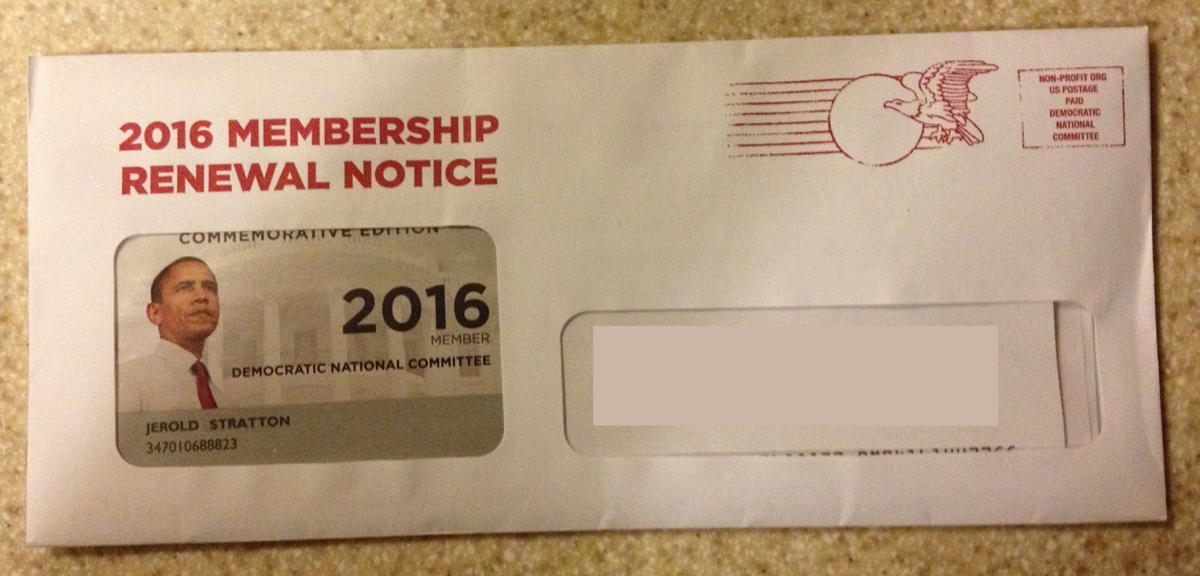Election 2016
Well, this is not what I expected when the campaigns started heating up in 2015. Just another reminder to hope for the best but prepare for Hillary and Donald.
- March 22, 2017: A tale of two negotiators
-
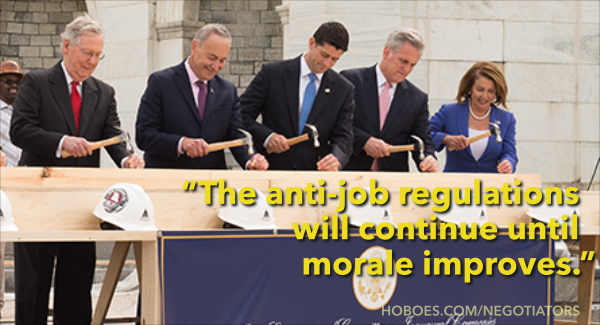
If you want to look at the difference between someone who knows how to negotiate and someone who doesn’t, look at Trump’s proposed budget and look at the House’s proposed “repeal” of Obamacare.
For years, Republicans have been promising repeal of Obamacare and to let people buy insurance again instead of outlawing it. They’ve even passed a few actual repeals—when those repeals had no chance of getting through former President Obama.
So now that they have a chance, what do they propose? A bill that not only doesn’t repeal Obamacare, but that doesn’t even repeal the parts of Obamacare that are causing skyrocketing health care costs. The Republican proposal continues to outlaw real insurance.
Real insurance lets us pay a nominal fee to protect ourselves against expensive medical needs that may or may not happen. But Obamacare—and the Republican “replacement”—still requires that any “insurance” we buy also cover the 100% probability that someone else will ask the insurance company to pay for something expensive that has already occurred.
That’s not insurance, that’s welfare by a fake name. There’s nothing wrong with having safety nets, but hiding the safety net under an Orwellian redefinition like this is guaranteed to make health care costs continue to skyrocket. Which, in turn, means that people will not be able to afford Obamacare plans.
But that’s really beside the point of my writing this. Why are congressional Republicans proposing this boondoggle instead of real reform? Because Democrats won’t let them pass real reform. Rather than propose real reform and let Democrats water it down, they are watering it down ahead of time without seeming to realize that Democrats will still want to make it worse.
Compare this to Trump’s budget proposal. It cuts funding for everything that doesn’t need funding: television stations that are practically self-funding anyway, abortion clinics that get tiny percentages from the federal government, assistance programs that get tiny percentages from the federal government. Research that will be performed by the private firms that stand to benefit anyway. Arts programs favored by the privileged few who can afford to pay for their own art.
It requires bureaucracies to justify their budgets instead of giving them the same budget they had last year plus some automatic increase.
- March 1, 2017: Election lessons: Obamacare and how compromise works
-
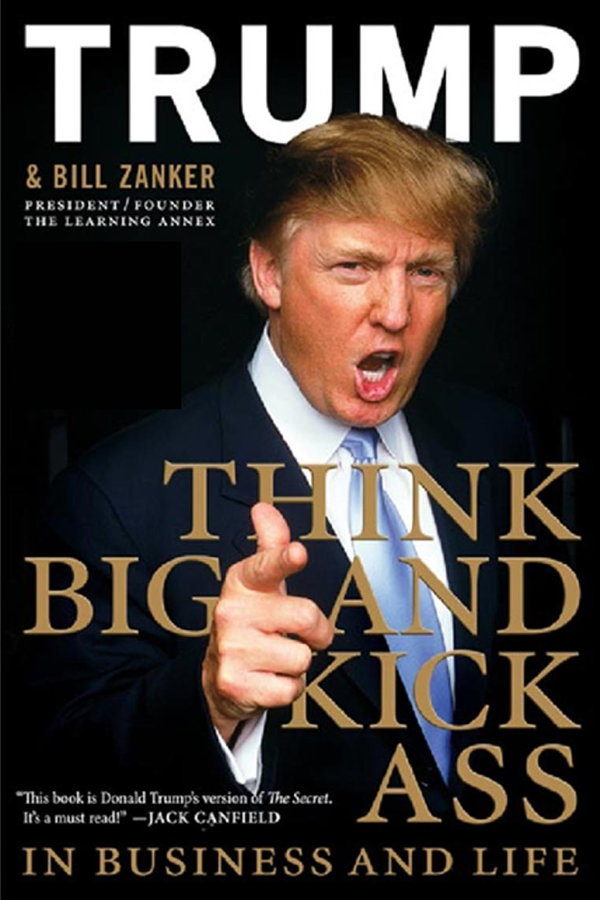
Not exactly the art of the deal but some people need a blunter education.
Republicans need to learn how to compromise. Conservatives often complain that Republicans compromise too much, but that’s not really true. The problem is that Republicans pre-compromise. They start negotiations where they should end them. This is how they got Trump.
For example, Rick Perry has already said about the Department of Energy that “I regret recommending its elimination.” That may or may not be good policy. But if he’s going to try to reduce the size of the department’s bureaucracy, it is very bad negotiation.
It’s not compromise if it happens before negotiations start.
Democrats in congress, of course, love it when Republicans don’t know how to negotiate, and hate it when they learn. Just recently I saw a meme going around about how President Trump was putting the two-state solution on the table in order to encourage peace in the region and negotiate “a really great peace deal”.
Oh. My. God. Peace is now a “deal”.
Of course peace is a deal. It’s something you negotiate for. But it’s frightening for the establishment left to see a nominally Republican politician who knows how to negotiate. If the rest of the Republican Party learns, they could be in deep trouble.
The worst-negotiated policy in the United States today is probably the unaffordable care act. You can’t get much more hardline, or more economically illiterate, than one party forcing everyone from every state to not only purchase health care plans if they don’t otherwise have one, but to purchase the same health care plans. Within each level, the ACA forces nearly exact duplicates, allowing for practically no individual customization or even regional customization.
Republicans won two midterm elections on the promise of repealing the ACA, and have passed several repeals that President Obama vetoed. But now, they’re having difficulty repealing the ACA because they don’t know how to compromise. They don’t know how to negotiate. They’re giving up options before negotiations even take place.
The ACA shouldn’t be particularly difficult to repeal. Half the country hates it, and the other half doesn’t have to use it directly. This is partly because congressional Democrats made no attempt to bring Republicans on board. Because the ACA was a purely partisan vote, there is nothing wrong with repealing it on a purely partisan vote. The complete end of the ACA and everything it does should be an option in negotiations.
- January 25, 2017: Corpseman resurrected: correcting Betsy DeVos
-
When discussing correct usage in any particular language, we have prescriptivists, who say that correct language is defined by the dictionary; users must follow the dictionary. And we have descriptivists, who say that correct language is defined by its users; dictionaries must follow usage.1 Now that there’s a Republican in office again, we shall have to add a third approach: leftists, who say that correct language is defined by them; everyone else is wrong, and must be corrected by the left.
It looks, that is, like the left is once again prescribing a single language in the United States, and denigrating anyone in politics who deviates from that language. Regional pronunciations and linguistic variations will once again be evidence that the speaker or writer should be excluded from public office, as they were during the Bush administration but were not during the Obama administration.
When the left’s icons use a different dialect, it’s folksy or down-to-earth. When a George Bush or a Sarah Palin speaks in a Texan or a Northern dialect—or, now a Michigan dialect—that’s a different story. Like owning a family business, this is another one of the walls that the beltway class wants to erect to keep the beltway free from attack by those not of the establishment.
The left’s current target is Department of Education nominee Betsy DeVos. DeVos wants to reduce the administrative burden currently imposed on teachers and the lack of educational diversity currently imposed on parents, and the left will have none of it. Therefore, her tweets are going to have to be corrected:
This pedantic correction meme is truly emblematic of the left. It is stuff like this that is a big part of why Jonah Goldberg’s Liberal Fascism rings so true. There is nothing wrong with DeVos’s tweet. Even ignoring that it’s a tweet and not formal writing, the only part of it even slightly odd is the capitalization of inauguration. But as a fan of Douglas Adams, A. A. Milne, and Lewis Carroll, capitalizations for emphasis are familiar to me in great stories; and the technique is not unknown in the United States.
- January 18, 2017: Is Trump calling the bluff of establishment Republicans?
-
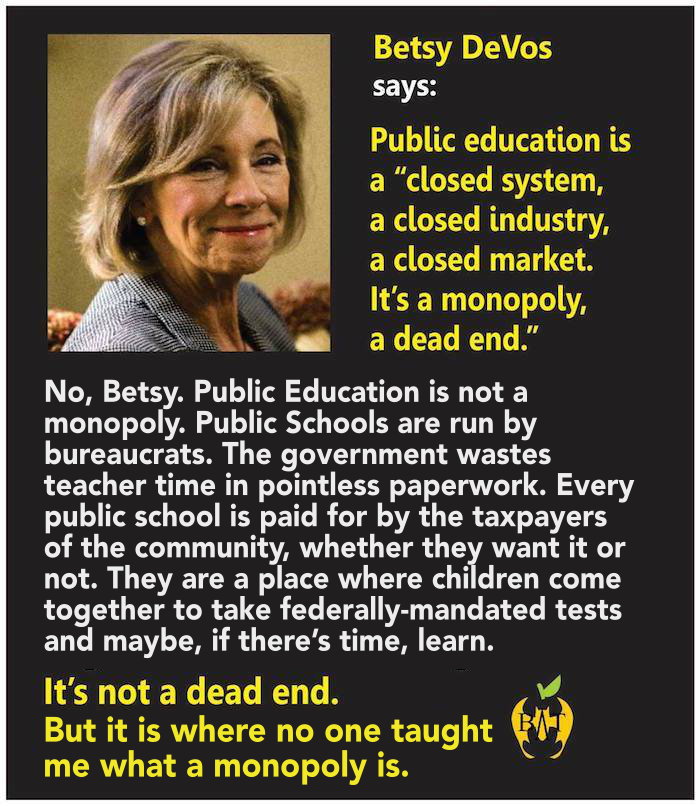
Posted by The Network for Public Education Action, whose staff has no idea what a monopoly actually is.
I wrote earlier that part of the problem with the beltway class in Washington is that they promise, don’t deliver, and then promise even harder so as to be believed this time around.
I have my own theory about the growing extremism of political rhetoric, which may explain the ironic and inexplicable rise of rhetoric when so little actually happens in DC. The first part of this theory is that politicians of the two parties see themselves as one team, the beltway, against the voters. They talk as if they are different; but they don’t act as if they are different.
Then, to prove that they really are different, they move their talk further to the extremes in the next election, so as to hide the fact that they haven’t even tried to fulfill their promises from the last election. This process repeats with more and more extreme rhetoric to make up for the less and less extreme actions.
Election promises become so extreme that we have politicians on one side promising, anti-Canute-style, to lower the ocean, and on the other, to outright disband entrenched government agencies.
It is unlikely they ever meant it, but Trump seems to be calling their bluff. It isn’t just that he’s appointing people like Rick Perry and Betsy DeVos; it’s that he’s appointing them specifically to agencies they have claimed—in Perry’s case, during a presidential election run—that they would like to disband.
If Rick Perry refuses to get rid of the Department of Energy, and Betsy DeVos refuses to get government out of parents’ education choices, that says a lot more about establishment politicians than it does about President Trump.
I would love to see Trump’s nominees reduce the federal government’s giant boot print on local energy and education decisions. But unlike Trump, Trump’s choices are mostly traditional politicians. I can’t see them reducing the power of their own agencies. Or, in Perry’s case, distributing its functions to other agencies and putting himself out of a job. Perry was a good governor, and I’d love to be wrong about him. But I’ll be surprised if I am.
- December 28, 2016: Why is the country so divided?
-
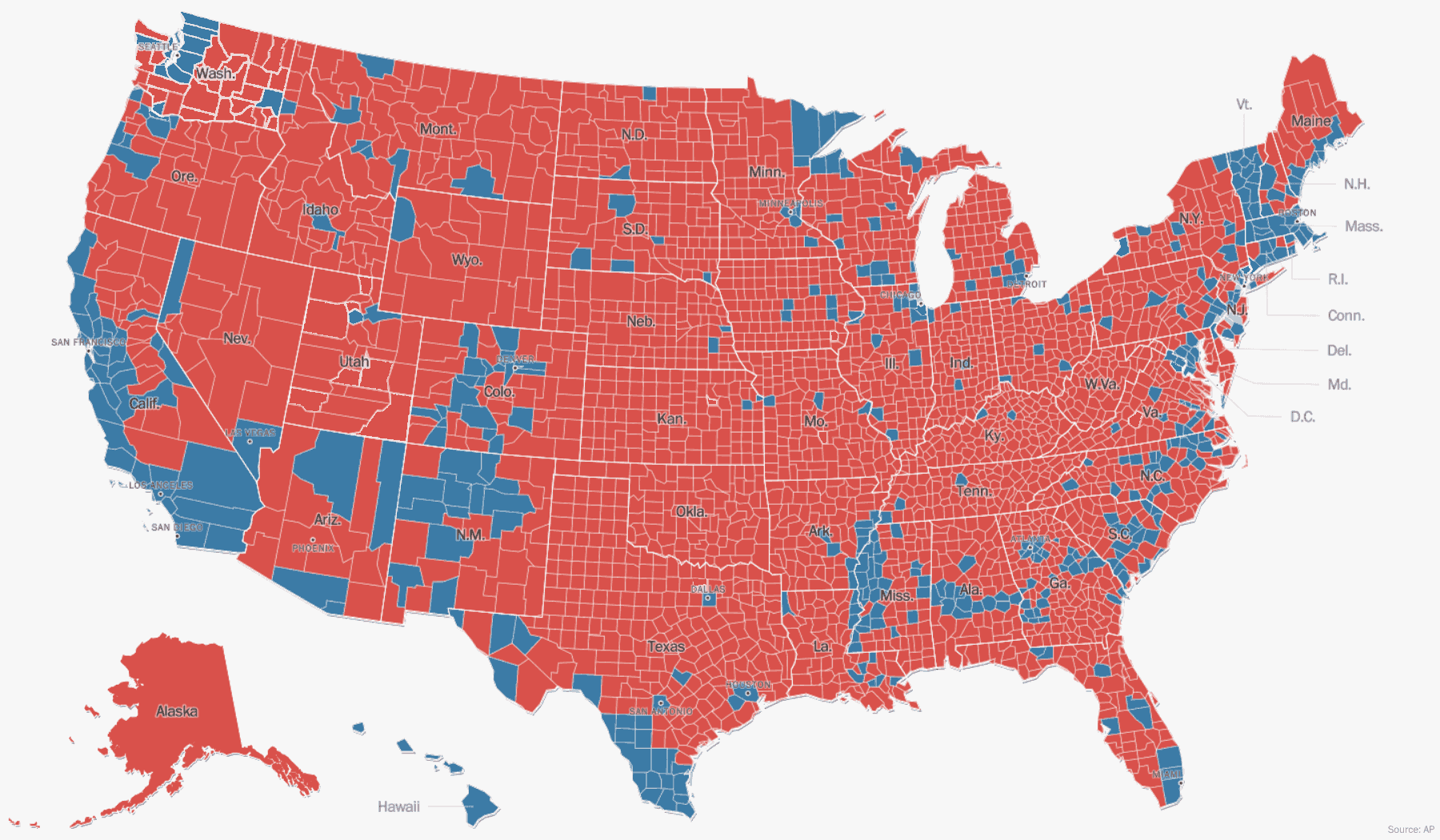
Title this map “Why an over-powerful central government causes divisiveness.”
The country is divided because the federal government has so much power. Disagreements are necessarily national disagreements, because the federal government’s decision in one town by default applies to every town in the country. Get the federal government back down to size and people won't have to be so divided. There is no alternative. As long as the federal government controls so much of individual life, politics will continue to be divisive.
Presidential elections are divisive because the president has so much more power. Executive decisions reach down to individual businesses and jobs, down to local communities and families. Put that power back into the hands of congress and local representatives, and people won't have to care so much about who is and is not president. That’s what divisiveness means. It means people care deeply about the decisions being made. There is no alternative. As long as the White House has so much power over individual lives, the presidency will continue to be a divisive position.
People will always care, deeply, about who has control over their lives.
Donald Trump is no more divisive than Barack “I won. Deal with it.” Obama. What you’re really complaining about is that Trump doesn’t back your pet causes but rather backs someone else’s. That’s the point. As long as Obama or Trump or any other single person has such power, they will occupy a divisive position.
Passing a law that took every private health insurance plan away, with no attempt at compromise with the other side—in fact, using parliamentary tricks to avoid legislative compromise—that was divisive. You just agreed with the outcome. Announcing that local high schools would have to let men into girls’ bathrooms, without any national discussion or local experimentation, that was divisive. You just agreed with the outcome.
Reducing the divisiveness in the United States is easy, but you have to be willing to do it: you have to be willing to put legislation under control of congress, where each locality’s and state’s representatives can vote on it, rather than under the executive, where only one person controls everything.
To further reduce divisiveness, move decisions back to local decision-makers. Get the federal government back to dealing with national issues, and let local governments deal with local issues.
- December 21, 2016: Election lessons: be careful what you wish for
-
I expect that one of big reasons Trump’s victory galls the media and the rest of the Democrats is that the media did their best to make sure Trump was the Republican nominee, and the Democrats did their best to make sure the media knew they wanted Trump as their opponent in the general. I’m not saying that this is the only reason Trump won the primaries, but it is clear from the leaked emails that Democrats wished for him to win the primary, because they knew he’d be easy to beat, and that key media figures were listening.
It was a guaranteed win for Hillary Clinton. But someone forgot to tell Donald Trump.
Now I see the same thing among conservatives and Republicans: wishing for something because you know it’ll be easy to beat. That’s a dangerous game to play when you’re not making the rules.
I see, for example, a lot of pundits hoping that Barack Obama becomes the de facto spokesperson for Democratic Party policies, because of the way he talks down to middle America. Or hoping for Keith Ellison to become the Democratic National Committee Chair because of the incendiary things he often says.
What they’re forgetting is that once President Obama is not President, the press can easily just not air him when he’s talking nonsense, and only show him when he sounds like an elder statesman. Few people outside the conservative movement see President Carter as anything other than a nice old man who helps build houses for the poor.1 They don’t see him working to help those who want to wipe Israel off the map, and to embolden Palestinian terrorists. They don’t see him undermining democratic elections in other countries, and whitewashing totalitarian fraud.
- December 14, 2016: How the left transformed vulgarity into courage and elected Donald Trump
-
An acquaintance of mine wrote, just before the election:
It is interesting to me that the same people who professed terror1 that transgender bathroom use would subject their wives and daughters to molesting and sexual assault2, have no problem with Donald Trump’s professed actions.
This is a common enough line of thought within the media and the establishment in general, and I’m pretty sure it is partly because of statements like this that Trump is now president. If he had said stuff like the female equivalent of “grab ’em by the balls” absent such overreactions from the press and the establishment in general, voters would have heard a vulgar person who does not have the qualities necessary to be President. But by arguing stridently that vulgar words are the equivalent of “molesting and sexual assault” and that those words are the same thing as professed actions and, therefore, you should then shut the hell up or we will continue to try to destroy you, the media and the left have transformed what would have been perceived as vulgarity into something reasonably perceived as courage. It takes courage to say words that powerful media will try to destroy you with.3
Courage is a quality necessary in a President.
- December 7, 2016: Clinton supporters, can we make a deal?
-
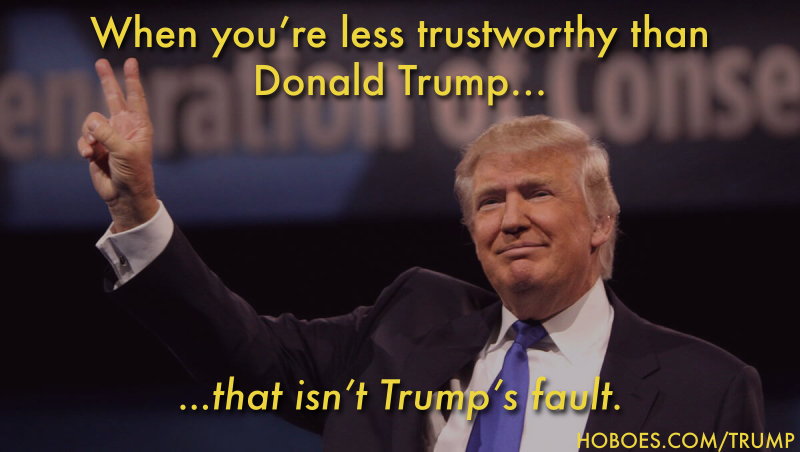
A writer I follow has asked Trump supporters to go down a list of “hypotheticals” and ask if Trump doing any of those things would make them “reconsider” their support for Donald Trump. I’m going to use that as the basis for this article, since it so neatly encapsulates the fear-mongering of the left since Donald Trump’s win.
- Crackdowns on educators
- Censoring of political speech
- Jailing of opposition leaders and/or reporters
- Systematic efforts to bankrupt institutions or news outlets
- Registries for minority or religious groups
- Restrictions on the Internet and social media
- Assaults on peaceful protestors and a blind eye toward prosecuting those responsible
- Defying court rulings
- Assassinations or detainment of dissidents
- Postponement of elections
- Internment camps
- Nuclear war
- Failure to recruit Bruce Willis to avert asteroid threatening Earth
Just take a moment, work with me, and think, “If, hypothetically, Trump were to do X, Y and Z from this list (or something else), then I would have to reconsider things.” Even if you think there’s less than zero chance of it happening. Even if it feels like an exercise in writing young adult dystopian fiction (which you should totally try by the way).
This is an amazing collection of apocalyptic fears. It is the kind of bullshit political fear-mongering that happens every four years, this time taken up to 11. It’s meant to sound reasonable while being completely insulting.
The line about postponing elections is something that the fringe on both sides tries to scare people with every two to four years from those fringe nut jobs whose self-image is predicated on the President being evil. Trump is not going to postpone elections any more than Obama was going to postpone elections, and Obama wasn’t any more likely than Bush to postpone elections, nor was Bush any more likely than Clinton to postpone elections, and so on for as long as I’ve been paying attention.
- November 30, 2016: Should people dismantle their life’s work, to enter politics?
-

“Sorry, son. You can’t grow up to be president unless you get rid of the family business.”—the political class
I went into November 8 determined to be happy whatever the outcome. If Hillary Clinton won, well, divided government is usually good for the economy as long as Republicans hold the House, which they were going to do. And if Donald Trump won, it would be a good and well-deserved black eye for the political establishment. One very good result of his election is that he punctured the class ceiling. He’s not from the political class, and it’s a good thing that people from outside the political class can still be elected to high office without turning “politics” into their career. But the political establishment obviously doesn’t think so. In the short run they’re trying to overturn the results of the election, and in the long term they’re trying to build some walls of their own to keep the political class safe.
Asking people to give up their family businesses in order to get into politics is one of those walls. They want to keep successful businesspeople on the other side of the political wall, and they want any businessperson who crosses it to pay for that wall. Trump’s holdings are much bigger than the average family business, but it’s still a family business; and for that matter the more successful a business is, the more important it is to its creators to hand it down to their children.
The members of the political class, politicians especially, usually have portfolios rather than businesses, because that’s how corruption works, and even when it isn’t corruption, that’s how investing works for political funds. It is relatively easy to put a portfolio into a blind trust.1
- November 23, 2016: Lessons for new Presidents: Entangling long-term alliances
-

That’s a mighty entangling alliance you got with that eagle there, George. (SharpWriter, CC-BY-NC-ND 3.0)
The New York Times recently headlined an oped by William S. Cohen and Gary Hart, Don’t retreat into fortress America. As headlines go it’s good advice, but I had to wonder where they were when President Obama retreated from Iraq, tried to bring terrorist inmates from Guantanamo Bay into the continental United States, turned Middle East foreign policy over to Russia, and threatened not to deal with a free Britain.
It’s the usual relative bullshit that ensures people don’t trust the media today: they’ve taken sides, and when their side retreats from long-term alliances, it’s right, when their enemy does it, it’s wrong.
But what form our long-term involvement overseas takes is a huge issue, one of trust—or the lack of it—brought on mainly by our abandonment of the Iraqi people
One of the defined duties of the United States President is negotiating the “permanent alliances with any portion of the foreign world” that President Washington feared would “entangle our peace and prosperity in the toils of European ambition, rivalship, interest, humor or caprice”. In the modern world, these entanglements did all that, but they also turned a fascist Germany into a modern democratic powerhouse, and turned a totalitarian Japan into a similar democratic economic miracle.
These entanglements continued following the Korean war, which was justifiably criticized as propping up a dictatorship—and yet still managed to produce a modern democratic country with a powerful economy in South Korea.
- November 16, 2016: Election lessons: The Supreme Court and the New Tone
-

If you’re a Democrat, would you rather have Ted Cruz in the Senate, where he would tend to keep Congressional Republicans from moving left, or in the Supreme Court, where he would tend to keep President Donald Trump in line?
The establishment left is often hypocritical. They will claim, for example, that standard map markers are firearms crosshairs, and that this is unacceptable political rhetoric. And then when they don’t get their way in an election, they’ll promise to train “the full firepower” of themselves and their supporters on the President of the United States—as the ACLU did in a post-election mailing a few days ago, while those supporters are literally rioting and threatening to kill the president-elect.
This despite the fact that the left has a very simple means of restraining a Trump presidency. Before the election, Donald Trump released a list of judges he’d appoint to the Supreme Court. All of them are conservative, and all of them are distrustful of executive lawmaking.
If the left is not just trolling their members for more money—if they are truly afraid that Trump will act in a totalitarian manner—what they should do is team with conservatives and make sure that Trump only nominates justices from that list. No judge on that list will allow Trump to exercise totalitarian powers. They are not judges who acquiesce to the mood of the day or to executive orders. That’s what makes them conservative.
The thing is, Democrats have pretty much ensured that Donald Trump will get whoever he nominates. Democrats threatened before the election, when Democrats thought that ignoring the working class was a winning strategy, that they were going to get rid of the supermajority requirement for bringing Supreme Court justices to a floor vote after they won the Senate.
They already got rid of the supermajority requirement for other positions in 2013 when they still held the Senate.
Democrats can do two things if they want to overcome their past intransigence and save the filibuster—and thus have an influence on some of Trump’s nominees. First, they really should apologize for what they did to Robert Bork. Conservatives are still using Bork as an example of bad behavior on the left, and for good reason. The Democrats’ behavior with Bork, a highly-rated judge, was the start of a decades-long Lucy-pulling-the-football series of antics. They’ve continued this, on and off, until it peaked during George W. Bush’s presidency.
- November 9, 2016: Congratulations, and condolences
-
By the time you read this, you will know who won the election and who lost. At the time I’m writing it, the outcome remains in doubt. Since it’s really a matter of which lizard1 wins, I’m going to sleep.
If your candidate lost, better luck next time.
Throughout history, poverty is the normal condition of man. Advances which permit this norm to be exceeded—here and there, now and then—are the work of an extremely small minority, frequently despised, often condemned, and almost always opposed by all right-thinking people. Whenever this tiny minority is kept from creating, or (as sometimes happens) is driven out of a society, the people then slip back into abject poverty.
This is known as “bad luck.” — Robert A. Heinlein (Time Enough for Love•)
If your candidate won, good luck.
“It comes from a very ancient democracy, you see… ”
“You mean, it comes from a world of lizards?”
“No,” said Ford, who by this time was a little more rational and coherent than he had been, having finally had the coffee forced down him, “nothing so simple. Nothing anything like so straightforward. On its world, the people are people. The leaders are lizards. The people hate the lizards and the lizards rule the people.”
“Odd,” said Arthur, “I thought you said it was a democracy.”
“I did,” said Ford. “It is.”
“So,” said Arthur, hoping he wasn’t sounding ridiculously obtuse, “why don’t people get rid of the lizards?”
“It honestly doesn’t occur to them,” said Ford. “They’ve all got the vote, so they all pretty much assume that the government they’ve voted in more or less approximates to the government they want.”
“You mean they actually vote for the lizards?”
“Oh yes,” said Ford with a shrug, “of course.”
“But,” said Arthur, going for the big one again, “why?”
“Because if they didn’t vote for a lizard,” said Ford, “the wrong lizard might get in. Got any gin?” — Douglas Adams (The Hitchhiker’s Guide to the Galaxy)
- November 2, 2016: Voting Nobody in 2016
-

Separated at birth?
For many years, or at least every four years, I wrote a Nobody For President musing. I stopped in 2008 because the choice between the two candidates was much clearer.
But if there’s any election to test the idea of voting for Nobody, it’s this one. Both Republicans and Democrats had Nobody in their primaries, and the Republicans, because they don’t have a super-delegate system to override the will of the people, elected theirs.
Bernie Sanders and Donald Trump were both Nobody for President; they were both protest votes. Only Trump won.
But because this Nobody is a real person rather than an empty seat, this is a crappy election. We’re either going to elect someone who clearly has no respect for women; or we’re going to elect someone who has viciously smeared women who have been sexually assaulted and raped and who has enabled multiple abusers, at least including her husband and her aide’s husband. Probably more.
I’m going to ramble a lot more than usual because Donald Trump is like voting Nobody in one sense: everyone in the DC elite hates him, including Republican leadership. When he tries to act like a Democrat, the press will call him on it—as he’s discovered. And both Republicans and Democrats in Congress will be ready to assert congressional power and reign him in.
The main difference between Clinton and Trump is that Clinton will get away with it.
Think about how FBI director James Comey’s press conference would have gone if it had been Trump who lied about reckless handling of national security secrets.
Instead of calling him careless and unreasonable, testifying under oath about lying, often, about reckless handling of classified information and irresponsible evasion of public records laws and then saying that those lies aren’t evidence of intent, Donald Trump would have been indicted.
The FBI and the Justice Department would not have let Trump get away with what they let Clinton get away with. The Attorney General would not have met with his spouse in a clandestine meeting..
- October 26, 2016: Two lessons for the price of one, for the Republican Party
-

Is it any surprise that the media will go after undecided voters who question Hillary Clinton, before they report on Hillary Clinton herself?
One difference between conservatives and the left: when conservatives lose at the polls, they try to figure out what went wrong, whether they were wrong about their positions or whether they should try harder, or better, at convincing voters that their positions are right.
They look to see what they did wrong.
When the left loses at the polls—Brexit, or the early close race between Clinton and Trump—they blame the voter.1 The vision of the anointed can’t be wrong. They even float ideas for cutting voters out of the equation entirely. Appoint an expert to make the right decisions, or switch to a parliamentary system that puts politicians in charge of appointing the president.
But appointing a dictator, expert or not, never works out well for the anointed, whenever it’s been tried. They always turn out to be more of an expert at dictating, and worse of an expert than the millions of combined consumers who know what they want and how much they want to pay for it.
So, on the likely flawed assumption that conservatives and the Republican Party share members, here are two lessons the Republican Party should learn from this election year.
First, Republican voters need to stop nominating candidates who expect the press to treat them like Democrats. From McCain to Romney to Trump, they all seem to think that if they act like Democrats, the press will let them get away with it. That since the press isn’t searching out forty-year old documents in which Hillary Clinton said that a twelve-year-old rape victim was asking for it, the press is also going to give their own ancient history a pass.
Sure, a WikiLeaks or a Project Veritas that reveals criminal behavior of Democrats will be derided by the press because of its source. They’ll even tell their viewers not to go out to look for that dangerous information on their own. But the press would just as surely search through, and deputize their viewers to search through, the same material if it were about Republicans.
- October 19, 2016: The candidate we deserve
-
Remember one thing about democracy. We can have anything we want and at the same time, we always end up with exactly what we deserve.—Edward Albee
One of the things that amazes me about this election is not just that Republican voters keep nominating candidates who think the press will treat them like Democrats. What amazes me is that such candidates still exist. Even after Dan Rather’s attempted October surprise lie against Bush, McCain and Romney weren’t ready for the lies made up about them. But at least they didn’t try to act like Democrats. Even after McCain and Romney were vilified by the press as Satan incarnate, Trump seemed to think that if he acted like a Democrat, the press would let him get away with it and treat him like a Democrat. That since the press isn’t searching out forty-year old documents in which Hillary Clinton said that a twelve-year-old rape victim was asking for it, they’re also going to give his own ancient history a pass.
Literally just being old made John McCain’s health an issue during the 2008 campaign and he never collapsed while leaving a ceremony early.
Democrats a huge advantage in an election with two really bad candidates. When Republicans nominate a bad candidate, many Republicans don’t pretend this candidate is great. Some will, in fact, not even vote for this candidate.
Democrats who nominate a careless and unreasonable criminal who is also a horrible person will not just continue to vote for that candidate; they will praise her. A Republican President whose potential successor had violated public records law like Hillary Clinton did would have asked that successor to resign. President Obama, however, “remains enthusiastic” about her even after her blatant violations of the law have become clear.
The reason Democrats had no problem screwing over Bernie Sanders and his supporters is that they knew his supporters would vote for them regardless.
- September 22, 2016: Should we hold regular elections for Supreme Court Justices?
-

Let’s choose Justices by the same process we use to choose the President. That should reduce the polarization surrounding the Supreme Court.
There’s an idea floating around about switching from appointing Supreme Court judges through a contentious dialogue between the White House and the Senate, and instead have a contentious national election. The idea is that since the Supreme Court is acting more like a legislature today, we should make it even more like a legislature.
If I weren’t liberally quoting the proponents in that explanation, I would think this is a satirical position: the Supreme Court is bad because of X. Therefore, we should do more X.
The problem, that the Supreme Court is acting more and more like a national legislature, is part of a bigger problem of nationalizing more and more things that ought to be decided locally. This means that issues that would not be contentious at the local level, because different localities could come to different decisions, become very contentious at the national level. Because these decisions are being made at the federal level, the federal Supreme Court must occasionally make decisions on whether those decisions are proper under the Constitution, as well as whether the implementation of those decisions by the executive is according to the law as written by the legislature.
Adding more national elections will only exacerbate that problem. It’s going to be much more difficult to localize decisions when voters become invested in deciding such problems in the Supreme Court.1
Our presidential elections are so polarizing because the federal government and the executive directly control so many aspects of our lives. The reason Senate and House elections are so often nationalized is the same: much of our lives are controlled by the federal government and so everyone everywhere has a stake in everyone else’s representative. The reason Supreme Court decisions and judges are controversial is that they are ruling on laws that literally control how we spend our paychecks and how we all, individually, handle our health care.
Our system of government was designed to localize politics; it’s taken a long time to get this far off course. We have all of one national election: the presidency. The next level in federal elections is the statewide election of Senators, and next to that is the community-wide election of House members.
- September 7, 2016: The Epaminondas Campaign
-

Do you think the people who made this San Diego monument in Barrio Logan are happy to be stuck with government-mandated crappy education, complex regulations that favor big corporations—who can afford the necessary lawyers to get around them—over local entrepreneurs, and dependency-oriented public assistance?
It’s that time of year when everybody tells politicians how they should run their campaigns. What interests me is the idea of outsiders, and what they could do differently because they are not bound by the restrictions of establishment politicians. If you’ve read my blog for the last year, you’ll know I’m not a huge Trump fan. But there is a place for a leader willing to go around the media and attack Democrats where they are weakest.
I recently read Victor Davis Hanson’s The Soul of Battle• and I highly recommend it. His basic thesis is that a great general can lead citizens on a moral crusade in favor of freedom against a supposedly strong opponent, if that opponent’s strength comes from exploiting a captive underclass.
A plantation class living off of a captive underclass is hollow, and can be defeated by freeing the underclass and attacking the plantation class’s pretensions.
The way to beat the Democrats is not to fight them on a conventional battlefield. The media defends them. But the media protection is hollow. A renegade politician should be able to go past it, like Sherman through Georgia, neither running from nor looking for battle, talking directly to the poor exploited by plantation Democrats.
This is how a real “no-boundaries” candidate would campaign against Democrats.
The poor are victims of Democrats. Say so. Identity politics makes blacks and hispanics victims of Democrats. Bring the campaign to them. Talk to them. Illegal immigration hurts blacks more than all other workers. Government-run education hurts blacks more than all other students.
Force Democrats and the media to explain why so many black students cannot read. Force Democrats and the media to explain why so many black workers cannot find a job.
Force them to explain why black independence was rising steadily until Johnson’s Great Society, when Democrats engineered dependence again upon the race they had previously enslaved.
Like the Democrats of the South, Democrats today can afford their leisure because they exploit black voters. That’s their strength, until it is their weakness.
- August 17, 2016: Trump and the media, the sequel
-
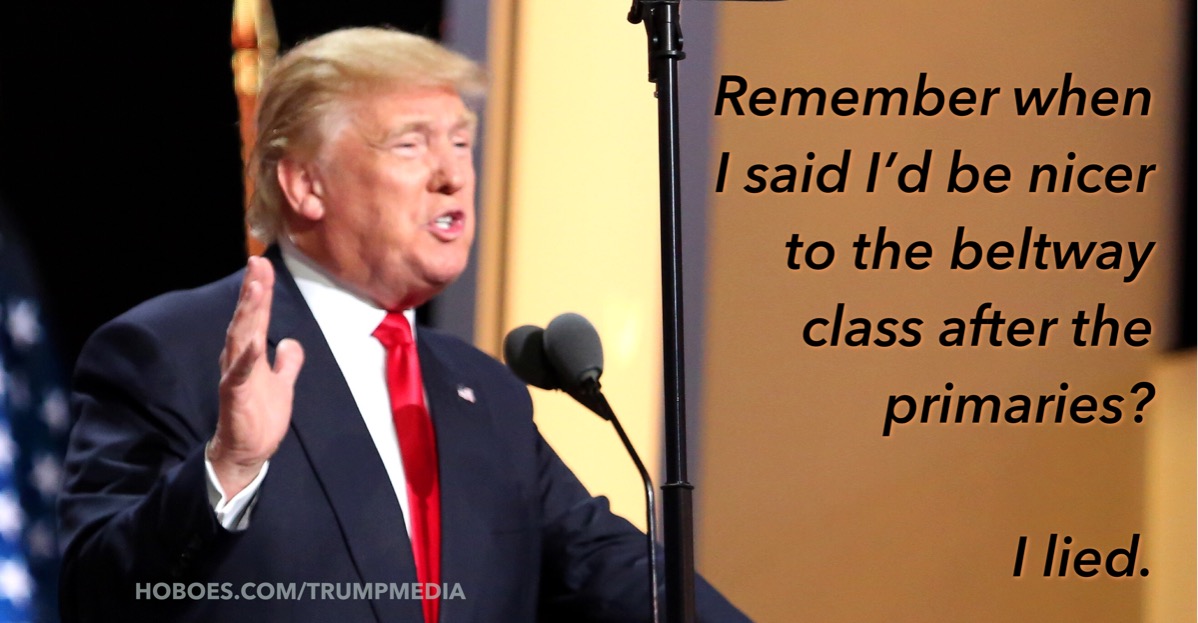
In California drought caused by lack of rain and progressive government, but mostly progressive government I wrote, in response to Donald Trump’s statements about California’s self-inflicted drought crisis:
I have no idea if Trump is just bloviating and doesn’t know what he’s talking about, occasionally randomly hitting the truth; or if he is, as Scott Adams thinks, crafty enough to realize that he has to preface truths with controversies that hook the media into reporting his statements.
Trump gets on the news where more reasoned speakers, such as Carly Fiorina and Ted Cruz, don’t. The media enjoys ridiculing their opponents, and does not enjoy engaging in substantive discussions.
Whether he knew it at the time or not, he’s definitely figured it out. Recently, Trump took the obvious criticisms of President Obama’s Middle-East retreat policy, that it fueled the growth of ISIS, one step further and said that Obama and Hillary Clinton “founded” ISIS.
Donald Trump got, predictably, media attention for that statement. On the Hugh Hewitt show, he affirmed that he meant “founded”. Hewitt disagreed with the term:
HH: …I think I would say they created, they lost the peace. They created the Libyan vacuum, they created the vacuum into which ISIS came, but they didn’t create ISIS. That’s what I would say.
DT: Well, I disagree.
HH: All right, that’s okay.
DT: I mean, with his bad policies, that’s why ISIS came about.
HH: That’s…
DT: If he would have done things properly, you wouldn’t have had ISIS.
HH: That’s true.
DT: Therefore, he was the founder of ISIS.
HH: And that’s, I’d just use different language to communicate it…
DT: But they wouldn’t talk about your language, and they do talk about my language, right?
So Trump knows that making these outrageous statements gets him air time where more reasonable statements do not.
This is one of the bedrock conservative principles: you get what you pay for. You get the behavior you reward. The media rewards outrageous statements, so they get outrageous statements.
They claimed they wanted reasoned and calm debate, up until Fred Thompson ran. Then they ignored and ridiculed his reasoned and calm debate. It’s worth quoting Patterico’s takedown of the media from that election year:
- August 3, 2016: Democratic National Committee membership scam
-
Despite having a low opinion of political leadership, especially the Democrats’ leadership, I was still a bit surprised to get a letter from President Obama and Vice President Biden asking me to renew my membership in the Democratic National Committee. This is a classic scam: send a renewal or invoice for something that hasn’t yet been purchased, in the hope that the recipient will think they’ve already made the decision to join/purchase the product.
I have never been a member of either party. I have registered as a Republican voter occasionally in order to vote in their primaries, but I’ve never joined any party. Nor any “National Committee” for any party.
To emphasize our camaraderie, both President Obama and Vice President Biden address me as “fellow democrat”:
Dear Fellow Democrat,
We’ve come a long way in the past seven years. And committed Democrats like you are the ones who made it possible.
…
I know that as a Democrat, you get it. So I’m counting on you to get your priorities straightened out, quit hangin’ out with hoodlums and sign your commitment to your party!
Well, perhaps he didn’t end it quite that way. It sure sounded like it, though.
President Obama was just as adamant about my current Democratic National Committee membership:
…I’m urging you to renew your DNC membership for 2016 today… [take] a moment right now to renew your DNC membership for 2016 with a generous donation.
So far, I have not received a similar scam from the Republican Party. I get a lot of letters from the Republican National Committee, but they ask me to join and donate, not renew and donate. (And I don’t do that, either.)
- June 29, 2016: Why now for the alt-right?
-
I was reading in the June Commentary about a faction in American politics called the alt-right that appears to have some heavily establishment politics: policy decisions by a technocratic elite, a disdain for the democratic process, and a preference for dealing with strongmen rather than engaging with and convincing voters.
They also appear to go in for bullying those who disagree with them, and many have aligned themselves with Donald Trump.
I can’t say whether James Kirchick paints an accurate picture of the movement. I honestly haven’t seen much of it except some comments in blogs, mainly the Ace of Spades HQ1.
But one thing missing from the article was any discussion of why now?2 There will always be angry factions ready to lash out, on every side. Usually, however, such factions remain tiny and ineffectual. To paraphrase Chauncey Gardiner, such movements will not take root unless the soil is prepared. In other words, why do they grow? Why now?
And the answer to that is, they grow when their tactics work, and their tactics clearly work now. Trump’s alt-right wasn’t first the first to use fascist tactics like these, nor are they the most common and blatant users of it. The tactics that Kirchick describes are no different from the left’s finger nannies who storm the phone lines and social media and even physical barricades to get people like Brendan Eich fired, or to get people fired from colleges.
- June 3, 2016: Sentences they shouldn’t have finished… that way…
-
Of course, putting together a serious independent campaign is a formidable task—but plenty of operatives and aides and donors and lawyers stand ready.—William Kristol, in Neither Clinton Nor Trump, The Weekly Standard, May 16, 2016
If there’s one way to ensure a Trump victory, it will be to pull together the donor class, operatives, and lawyers to stand athwart the mad rush of exiting independents yelling “he doesn’t stand for us.”
This sentence encapsulates one of the major reasons Trump did so well, and validates his choice to run against the establishment despite being a part of it. I don’t think Kristol could have put together a more pitiable battle cry if he’d tried.
- June 1, 2016: California drought caused by lack of rain and progressive government, but mostly progressive government
-

This graphic appears, from the accompanying article, to chronicle major reservoir capacity up to 2014. I could not find the underlying data, but its numbers seem to match the current capacity of 40 to 50 million acre-feet listed in various other articles. (Water in the West, Stanford University)
There are of course many reasons for Donald Trump’s appeal to masses of voters, first in Republican primaries—especially open primaries—and now, apparently, among the general voting public. But one powerful reason is the media’s refusal to air conservative ideas.
A fine example of that came over the weekend when Trump claimed that there is no drought in California, and the real reason for California’s water shortage rests entirely on the shoulders of California’s progressive government.1
If a Carly Fiorina or a Ted Cruz were to point out that California’s water shortage was the result of successive progressive governments imposing a near-complete moratorium on building new reservoirs even while California’s population doubled; and that California exacerbated the shortage by releasing trillions of gallons of fresh water to the ocean because of a tiny fish, it would not have been news.
More specifically, it would not have been on the news. Conservatives have been talking about why California has been suffering from a government-created water shortage for years. Victor Davis Hanson should be brought on as an expert every time a television show does a piece on the drought. But he isn’t, because the media is covering for Democrats in California and in the rest of the nation. If they hadn’t, if they had allowed the debate to play out nationally, Trump would not be able to make it an issue. The resolution might or might not have been a conservative one, but there would have been a resolution that voters took part in. It didn’t get on the news, however, because the news was covering for the left.
- May 4, 2016: Crony vs. Crony
-

Perhaps my standards are too high. (SharpWriter, CC-BY-NC-ND 3.0)
I’m writing this before the Indiana primary returns come in Tuesday evening, but given that Indiana’s is an open primary, and Donald Trump does well in open primaries, I’m guessing he’s going to win it. So by Wednesday morning when this post goes live the Republican primaries may well be decided in Trump’s favor.
One of the strangest conspiracy theories I’ve been hearing ever since Trump entered the race is that he’s a stalking horse for Hillary Clinton, to keep the Republicans from taking the White House in a year where it seemed impossible for them to lose.
It’s an understandable theory. Trump has supported leftist policies far more than conservative policies, and he’s supported crony government for most of his career, if not all of it. Further, Trump comes across less as a conservative and more as a caricature of what the left thinks conservatives are. It’s as if he’s a Democrat playing the role of conservative.
More recently, however, in keeping with Douglas Adams’s dictum that once you think you understand something it will be replaced with something even more bizarre, there is the competing theory that Trump is really a conspiracy of the Republican establishment. They were looking at an almost guaranteed win in 2016, which would have meant responsibility. Worse, the guaranteed winner might even have been a conservative anti-establishment figure!
They needed to snatch defeat from the jaws of victory, and who has bigger jaws than Donald Trump?
But while the establishment has certainly warmed to Trump lately when the alternative has been the strongly conservative and anti-establishment Ted Cruz, I doubt that either of these conspiracy theories is true. I think it’s more likely that Trump wants to be President, and he looked at the Democratic Party’s system of super delegates, saw it would be practically impossible to beat Hillary Clinton there even with a majority of votes, and so decided to run in the Republican primaries instead.
The reason he looks like the establishment is that its who he hangs out with in DC. Like most of DC, he has no other perspective.
- April 13, 2016: You want your party back; so do Trump supporters
-

The Beltway Party.
Janet Reid, an agent I follow, posted a political rant on Facebook recently:
THIS IS A POLITICAL POST. Fair warning.
Tonight my ride home was provided by a nice man in a yellow cab. His accent had a moderate French inflection and I asked him if he’d come here from another country.
Well, yes indeed, as a young man he came to America 22 years ago to seek his fortune and make his way in the world. He came from Ivory Coast, a country on the west coast of Africa. West of Ghana, east of Guinea and Liberia, south of Mali, and Burkina Faso. A country rich in history and pretty much unknown to most Americans.
17,000 people from Ivory Coast live here now, he told me in the course of our conversation. Not a lot, as New York standards go, but a significant number.
They’re all working hard, raising families, paying their taxes and this man in particular was frankly providing a service tonight that I really wanted (a nice quick ride home—he drove like the wind!)
When politicians tell me they want to ban immigrants of all stripes and kinds, I think of men like this taxi driver and others. All they want is what America has to offer: a stable economy, clean water, food, and an opportunity to make a living and support a family.
I asked him if he had a preference in the upcoming presidential race. It will surprise none of you to learn he is not supporting any of the Republicans although he is himself a businessman and in favor of many of the things the Republicans used to stand for.
That is eloquent and true. It also misses the root problem. Longtime blog readers know I agree with what Janet wrote about immigration. But having grown up in Michigan I have some understanding of Trump’s supporters’ views as well. Until we can understand why this rhetoric works with voters we will not be able to change its success.
When politicians talk about “jobs Americans won’t do” and how that means we need to support illegal immigration, I know from experience that Americans will do those jobs. My mom worked in the fields before illegal immigration spread to Michigan. My mom, not my dad, not my brothers (although we did some baling hay, too), my mother and many other housewives in our area.
- March 15, 2016: Ted Cruz: The anti-extremism candidate?
-

“Are you coming to the tree?”
There is a theory which states that if anyone discovers exactly how the United States primary system works it will instantly disappear and be replaced with something even more bizarre and inexplicable.
There is another theory which states that this has already happened.
In The Hitchhiker’s Guide to the Galaxy, the universe is run by a person with no sense of cause and effect and to whom words mean nothing, other than what he chooses to believe they mean. In other words, he was one of Thomas Sowell’s anointed. This is supposed to avoid drama, but of course in Douglas Adams’s telling it created drama.
The Republican establishment tried to avoid drama this year by compressing the primaries so that the process would favor a more establishment candidate with money behind them—that is, someone who could afford to compete in a series of simultaneous large primary collections in quick succession.
They had assistance from the media establishment, who created debate rules which favored candidates with name recognition before the primaries even started. In other words, the media establishment created rules which favored the political establishment.
Their plan succeeded: they have a rich establishment Democrat running ahead in their primaries, and now that he’s finally beginning to fade it may be too late to overcome his lead, due to the accelerated primary season.
This is why I support a longer primary season with few, if any, Super Tuesdays and with smaller states coming first. This would allow a candidate to both build support and be investigated in smaller venues where they can go one-on-one and where love affairs with new faces will have time to return to earth before the delegate count overrides reason.
Longer periods with reasonable rules will tend to dampen down extremism, because it allows the slow and steady to succeed.
And of course the Democratic primaries have their own bizarre rule by an elite, in their case a group of super-delegates who can override the choice of the Democrat base.
Centralizing power is almost always a bad idea. Republicans are supposed to know this.
- March 9, 2016: How did Donald Trump qualify for a middle-class tax break?
-

Aaron Epstein, or his headline writer, asks, How did Trump qualify for a middle-class tax break?
The answer is simple: because Donald Trump can afford more and better lawyers than the middle-class.
Or, as the accountant they interviewed for the article, Joe Perry, said,
“A person like Trump has options for reporting income that most people don’t have,” Perry said.
Not necessarily big news, but it came at the same time as USA Today reports that 27 giant profitable companies paid no taxes. It’s a boring article. Most paid no taxes either because they recently lost a lot of money and are crawling out of a financial hole, or because they made much of that profit overseas and left it there. Technically, both of those options are open to individuals—including the middle class—but, as Perry might say, giant profitable companies have options that most people don’t.
The reason that they have those options is because the tax code is so incredibly complex. It rewards people who can afford to hire accountants and lawyers who are experts in the tax code. The solution to that is pretty simple: simplify the tax code. Get rid of the arcane subsidies.
A relative of mine posted the USA Today article to Facebook. Normally she’s pretty left-leaning—she supports Sanders, for example—but this is an issue that divides along beltway lines—that is, inside and outside—not along partisan lines. Everyone who pays taxes would like to simplify them; everyone who creates taxes would love to make them more complicated. I wrote something like this in the comments:
Yes, giant companies can afford to hire tax specialists to take advantage of our incredibly complex tax system. Complex tax laws make the system easier for giant companies to game. That’s why good reformers, such as Carly Fiorina and Ted Cruz, are trying to radically simplify our tax laws. Simpler tax laws aren’t as easy to game, and further, when they are gamed, it is easier to see. It’s easier for the average person to understand a three-page tax law than a 3,000-page tax law.1
That’s not exactly what I wrote. Shortly after I wrote it, she deleted the share, and I didn’t keep a copy of my comment.
- March 1, 2016: Obama vs. Trump vs. Hitler: A letter to my friends on the left
-

Hm… where have we seen a blustering President antagonizing opposing politicians, agonizing our international allies, and in general abusing presidential power to get around the legislative process?
To my friends on the left complaining about what Trump will do, you don’t care what Trump will do. You care only that it’s Trump doing it. You could have stopped Trump at any time in the last eight years.
You could have stopped Trump when President Obama weaponized the IRS against people he disagreed with.
You could have stopped Trump when President Obama and the Democrats decided to federalize health insurance without any input from conservatives or even Republicans.
You could have stopped Trump when Secretary of State Clinton funneled corporate and foreign bribes through the Clinton Foundation.
You could, in other words, have stopped Trump when a politician you supported implemented the powers that make Trump dangerous.
While I share your worries about the cult of personality surrounding Donald Trump, if we survived eight years of schools teaching children to sing the praises of Barack Obama literally like he was Jesus we can survive Donald Trump. Trump lacks one essential thing that President Obama has: the support of the media. A Trump who weaponizes the IRS will see the story headlined across every major newspaper, for example.
But if that doesn’t matter, it’s your fault. For years, conservatives have been complaining about the weaponization of the IRS and other federal bureaucracies. Even under Republican administrations, conservatives have complained about the growth of the federal government into our private lives.
You only complained when there was a Republican president. When there’s a Democrat in the White House—well then, a federal takeover of the entire health care industry is a great idea, despite its yuge potential for abuse.
A lot of his supporters seem to think Trump will use the power of the presidency to abuse their political opponents rather than them. They learned this from you.
You created the culture of I won. Deal with it. Of passing thousand-page bills on purely partisan lines with no attempt at compromise. Of reveling in not having read the bills your cronies wrote.
Trump’s supporters are tired of nominating candidates you pretend to admire right up until they secure the nomination. They want someone who fights, and they want it because of you and your duplicity.
- February 3, 2016: Is Iowa the end of the game, or the beginning?
-
I’ve been hearing a lot from pundits about how low-polling candidates should leave the race now that the Iowa caucus is over. I think that’s wrong. For pundits, Iowa looks like the end of the game because the guessing is over, and the results are coming in. But while, for pundits, Iowa is the end of the game, for everyone else it’s the beginning. Non-pundits and non-candidates haven’t been focused on the election, and are only now starting to care who their choice should be.
For the candidates, everything up to Iowa has been practice. It’s all been pre-game up to this point. Iowa is the beginning of the actual race. You don’t leave the game at the end of the first play. At some point, the math will start to become impossible, and a little after that the math will actually be impossible. But as it stands today, 99% of delegates remain up for grabs. Leaving the race now, just because of a loss in one state, would be non-presidential. A campaign that can’t afford to continue has not spent its money or resources wisely—and it’s the candidate who ultimately is responsible for that. We, or I at any rate, want a president who can budget for the whole game, not spend everything at one play at the beginning.
Right now the pundits are saying that the Broncos are going to lose on Sunday, and the pundits are probably right. But the only way to know for sure is to play the game.
So while I join those joking about Kasich and lower from the Iowa results keeping their chopping hands out of the debates, his loss in Iowa is no reason for Kasich to leave, nor should he. His chances of winning are tiny. But his chances are far less if he leaves the race.
This does not mean, of course, that pundits who have chosen sides can’t try to convince candidates to leave the race if they think that candidate’s supporters will go to their own preference. That’s all part of the game. But falling for it is pretty much proof you weren’t right for the part.
- December 28, 2015: Bernie Sander’s Ponzi scheme
-
I called it corruption, John Hinderaker calls it fraud, but it’s the same thing.
Only under socialism could Fidel Castro become the richest warlord, relative to his subjects’ wealth, in recorded history. (And that was the least of his sins.) Only under socialism could Maria Gabriela Chavez, daughter of socialist tribune of the people Hugo Chavez, beloved by the American left, waltz off with a $4 billion fortune. But then, she was a piker: Chavez’s Minister of the Treasury stashed $11 billion in Swiss bank accounts.
“Ponzi’s mistake was that he should have gone into politics.” And the people who perpetrate the Ponzi scheme that is socialism know what they are doing. They’re putting themselves in the position of being able to reap the benefits of their schemes. Look at some of the examples Hinderaker gives. These aren’t just run-of-the-mill socialists; they’re the heroes of the left.
That’s why Sanders didn’t criticize Hillary’s “damn emails”. The emails proved nothing but that Hillary Clinton is corrupt, and Bernie Sanders wants to share in that corruption. It’s why he’s a socialist politician. All politicians are in the position to be corrupt, but socialism makes corruption official policy.
- December 16, 2015: How to counter Trump’s immigration policy
-

Several weeks ago, before the San Bernardino murders and Donald Trump’s response to them, I wrote that “Americans don’t distrust refugees. They distrust the federal government, because they have seen the federal government’s deliberate failures and deliberate lies about illegal immigrants.”
I’m not alone in saying that people are justified in their distrust of the political establishment’s immigration fecklessness. Richard Fernandez wrote more recently that:
A much simpler explanation for the fear which drives the Trump crowds is a loss of confidence in government assurances that they will keep the public safe.
…
The desire for a moratorium on Muslim immigration may be driven less by a distrust of foreigners than by a deep suspicion of the Obama administration’s screening procedures which have so signally failed. Yet after all these fiascos the administration demands ever-greater powers to spy, not only on the NRA but on Muslims too!
Donald Trump is mostly the fault of the political establishment. They have trained people to accept politicians who lie to them, in the hope that on one important policy the politician will at least keep a few of their promises.
A person can only be lied to so much before they just stop listening, and there are few topics in politics where we’ve been lied to more than on immigration.
The political and intellectual establishment has been doing what they always do when reasonable concerns are raised against their policies: crying that their opponents are mean, or, in this case, racist.
When people raised concerns about giving a pass to immigrants who are by definition criminals the establishment called them racist.
When people raised concerns about terrorists sneaking through our poorly-designed legal immigration system, the establishment called them racist, and heartless for wanting to break up families.
When people raised concerns that letting immigrants bypass the normal immigration process, simply by saying that they’re refugees, might let terrorists in, the establishment called them racist, and heartless for opposing all these children and widows.
They were obviously wrong about these things even without the benefit of hindsight. With the benefit of hindsight, we can see the extent of their lies.
A broken immigration system may not be the worst source of crime in the United States, but it is one we potentially have a lot of control over.
Trump’s call to simply ban all Muslims from entering picked up his polls because it bypasses all of the lies of the political establishment, which, ironically, he is a part of.
- November 18, 2015: Who wants the United States to lead?
-
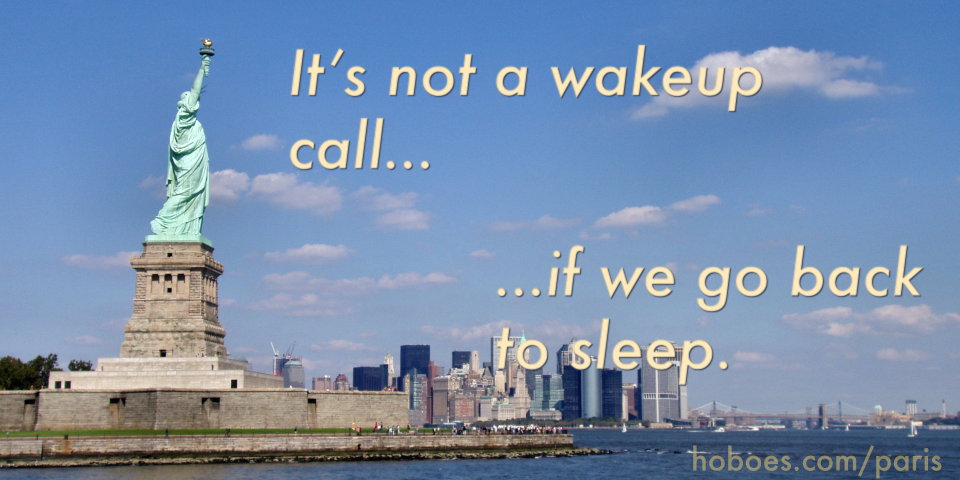
Quote courtesy Greg Gutfeld.
After the first or second Republican debate, some friends on Facebook took issue with Republican candidate complaints that under President Obama, the United States no longer attempts to lead the world in promoting peace and democratic values.
I must have missed something. I listened to almost every candidate in the Republican debate last night say “We’re going to lead the world again.” I have never, ever, heard ANY country say they wanted us to lead the world. Must have been napping.
This is a reasonable question, as long as it isn’t asked rhetorically. It’s true, the countries often don’t say it. But the people in a lot of countries do. I doubt my friends were napping during the coverage of the 2009 Green movement in Iran—they just forgot. But the Iranians haven’t. It wouldn’t have taken much leadership from the United States for that to end without bloodshed and with free speech improvements inside Iran, and the protestors knew this: they were asking the United States to get involved. I’m also pretty sure that the government in East Germany would have preferred that we not take a lead in world affairs, but the people of East Germany were well-served by our not accommodating the Soviet Union’s repression.
Imprisoned dissidents used to whisper from cell to cell the lead President Reagan took, that the Soviet Union would rather have been left alone.
More recently the government in Ukraine asked for us to lead, and there would have been much less bloodshed if we had; Russia would have backed down instead of invading. Instead there’s a low-level war still going on there, threatening daily to erupt into a full-fledged bloodbath.
It wouldn’t have taken bloodshed to side with the people of Iraq when they tossed their strongman in 2010. Instead we sided with the strongman who turned out to be too weak to stop ISIS. The people of Iraq would certainly have preferred that we lead, even while their government short-sightedly preferred that we retreat. If we had exercised leadership in Iraq, it’s entirely likely that ISIS would never have grown strong enough to perpetrate this weekend’s Paris attacks. The people of Paris, if they’re thinking about it at all after that horror, are probably wishing we had not retreated from the Middle East and allowed ISIS to grow.
- November 3, 2015: Why is the media saying Sanders lost the debate?
-
A lot of my far-left leaning friends are confused about why media talking heads keep saying that Bernie Sanders lost the debate. A lot of the media is in Hillary Clinton’s camp, true, but a lot of them are openly pro-Sanders. And members of both camps say that Sanders lost.
Many journalists on both sides think socialism has never received a fair shake in the United States. They don’t seem to understand that socialism—especially the so-called Democratic Socialism that Sanders espouses, in which private industry remains free, mainly, to assist government—inevitably leads to cronyism and corruption. Socialism practically means cronyism and corruption.
They, the media, believe in a kind of magical socialism run by an angelic political elite, and that if socialism just received a fair hearing voters would approve it. That open hearing is what the pro-Sanders crowd—and a lot of the pro-Clinton crowd—hoped for in Bernie Sanders.
To an extent, I agree with them. Up to the debate, I thought it would be good for Sanders to be the Democrats’ nominee because Sanders could articulate an argument for socialism, it would receive a fair hearing, and one of the pro-freedom candidates in the Republican Party—Fiorina, Cruz, Carson—would provide an articulate argument in favor of freedom.
But the debate changed that. There were two ways for Hillary Clinton to win the debate: she could have provided a clear contrast between her progressive politics and Sanders’s socialism, or Sanders could fail to provide a contrast between Hillary and himself. That’s why his refusal to distance himself from her corruption was interpreted as a loss. The media talking heads are claiming that they think Sanders lost because he didn’t “bring the fight” to Clinton. That his compassionate absolution of the Clinton Foundation and State Department email scandal lost him the debate. But that narrative is lipstick on a pig. The pro-Clinton side doesn’t want to acknowledge her corruption, and the pro-Socialism side (which of course overlaps) doesn’t want to acknowledge the truth that Sanders spoke about their ideology. Because Sanders spoke an important and inconvenient truth when he condoned Clinton’s corruption and cronyism—that this is socialism.
- August 26, 2015: The Parable of the Primary
-

You want George Washington with a Maxim gun. You’ll settle for a brash businessman with a helicopter. But you’ll get just another crony government politician. (SharpWriter, CC-BY-NC-ND 3.0)
The strong lineup among Republican presidential contenders and the media—and voter—fascination with Donald Trump is reminding me a little of the joke/parable of the man caught in a flood.
“Lord, why did you not send us a good candidate to save us? We cried and complained from the rooftops for one! We had to put our backing behind a Democrat with a big mouth and a helicopter!”
I sent you a quiet fighter who in a blue state overcame the biggest and richest Democrat special interest group of all—government unions—in both a recall election and a re-election. I sent you a firebrand from Texas who almost single-handedly kept the government health care takeover in voter’s minds as a Democrat-only policy and handed Republicans a Senate victory a year later because of it. I gave you a determined outsider who could articulate conservative values like Reagan, who ran a company bigger than most states, and who overcame health issues and gender issues during a year when the press wants to focus the election on both. What in the hell were you waiting for?
This year has the best candidates running for the nomination that I’ve seen in a long time. I absolutely get the fascination with Donald Trump, and I’m not at all doubting that Trump can win the general election. My doubt, and it’s a strong one, is whether he’ll govern as a Conservative, or even as a Republican instead of as the crony Democrat he’s been up until now. He’s not even running as a Republican—he’s running against the Republican Party as much as he’s running against his opponents in the Republican Party and he’s making no promises about accepting the results of the Republican primaries.



